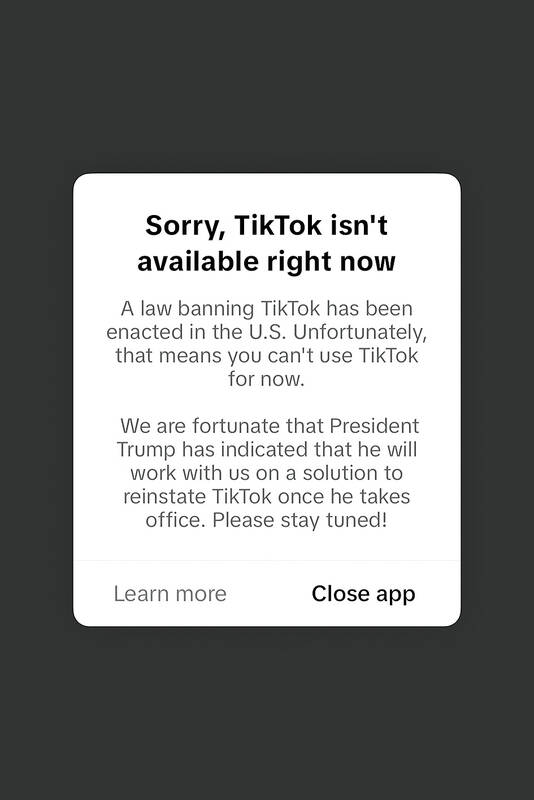Millions of TikTok users were blocked from accessing the popular app in the US as a national ban came into effect yesterday, with US president-elect Donald Trump unable to intervene until he takes office.
TikTok, removed from prominent app stores hours before the ban, said in a message to users attempting to log on that a “law banning TikTok has been enacted in the US.”
“Unfortunately, that means you can’t use TikTok for now,” it said. “We are fortunate that President Trump has indicated that he will work with us on a solution to reinstate TikTok once he takes office. Please stay tuned!”

The blackout followed a US Supreme Court decision on Friday to uphold a law banning the popular video-sharing platform in the name of national security, unless its Chinese owners reached a deal to sell it to non-Chinese buyers by yesterday.
From teenage dancers to grandmothers sharing cooking tips, TikTok has been embraced for its ability to transform ordinary users into global celebrities when a video goes viral.
It also has a fan in Trump, who has credited the app with connecting him to younger voters, contributing to his election victory in November last year.
After discussing TikTok with Chinese President Xi Jinping (習近平), Trump told NBC News on Saturday that he could activate a 90-day reprieve after he reclaims the Oval Office today.
“The 90-day extension is something that will be most likely done, because it’s appropriate,” he said. “If I decide to do that, I’ll probably announce it on Monday.”
The law allows a 90-day delay if the White House can show progress toward a viable deal, but TikTok owner ByteDance has flatly refused any sale.
Outgoing US President Joe Biden’s administration has said it would leave the matter to Trump. TikTok chief executive officer Chew Shou Zi (周受資) appealed to Trump after the court defeat, thanking him for his “commitment to work with us to find a solution.”
Chew — who is also set to attend today’s inauguration — said Trump “truly understands our platform.”
Besides removing TikTok from app stores, the law requires Apple and Google to block new downloads, with the companies liable for penalties of up to US$5,000 per user if the app is accessed.
Oracle, which hosts TikTok’s servers, would also be legally obligated to enforce the ban.

INVESTIGATION: The case is the latest instance of a DPP figure being implicated in an espionage network accused of allegedly leaking information to Chinese intelligence Democratic Progressive Party (DPP) member Ho Jen-chieh (何仁傑) was detained and held incommunicado yesterday on suspicion of spying for China during his tenure as assistant to then-minister of foreign affairs Joseph Wu (吳釗燮). The Taipei District Prosecutors’ Office said Ho was implicated during its investigation into alleged spying activities by former Presidential Office consultant Wu Shang-yu (吳尚雨). Prosecutors said there is reason to believe Ho breached the National Security Act (國家安全法) by leaking classified Ministry of Foreign Affairs information to Chinese intelligence. Following interrogation, prosecutors petitioned the Taipei District Court to detain Ho, citing concerns over potential collusion or tampering of evidence. The

‘FORM OF PROTEST’: The German Institute Taipei said it was ‘shocked’ to see Nazi symbolism used in connection with political aims as it condemned the incident Sung Chien-liang (宋建樑), who led efforts to recall Democratic Progressive Party (DPP) Legislator Lee Kun-cheng (李坤城), was released on bail of NT$80,000 yesterday amid an outcry over a Nazi armband he wore to questioning the night before. Sung arrived at the New Taipei City District Prosecutors’ Office for questioning in a recall petition forgery case on Tuesday night wearing a red armband bearing a swastika, carrying a copy of Adolf Hitler’s Mein Kampf and giving a Nazi salute. Sung left the building at 1:15am without the armband and apparently covering the book with a coat. This is a serious international scandal and Chinese

Seventy percent of middle and elementary schools now conduct English classes entirely in English, the Ministry of Education said, as it encourages schools nationwide to adopt this practice Minister of Education (MOE) Cheng Ying-yao (鄭英耀) is scheduled to present a report on the government’s bilingual education policy to the Legislative Yuan’s Education and Culture Committee today. The report would outline strategies aimed at expanding access to education, reducing regional disparities and improving talent cultivation. Implementation of bilingual education policies has varied across local governments, occasionally drawing public criticism. For example, some schools have required teachers of non-English subjects to pass English proficiency

TRADE: The premier pledged safeguards on ‘Made in Taiwan’ labeling, anti-dumping measures and stricter export controls to strengthen its position in trade talks Products labeled “made in Taiwan” must be genuinely made in Taiwan, Premier Cho Jung-tai (卓榮泰) said yesterday, vowing to enforce strict safeguards against “origin laundering” and initiate anti-dumping investigations to prevent China dumping its products in Taiwan. Cho made the remarks in a discussion session with representatives from industries in Kaohsiung. In response to the US government’s recent announcement of “reciprocal” tariffs on its trading partners, President William Lai (賴清德) and Cho last week began a series of consultations with industry leaders nationwide to gather feedback and address concerns. Taiwanese and US officials held a videoconference on Friday evening to discuss the